NRSG367: Transition to Professional Nursing
VerifiedAdded on 2020/05/01
|6
|1467
|103
AI Summary
Contribute Materials
Your contribution can guide someone’s learning journey. Share your
documents today.
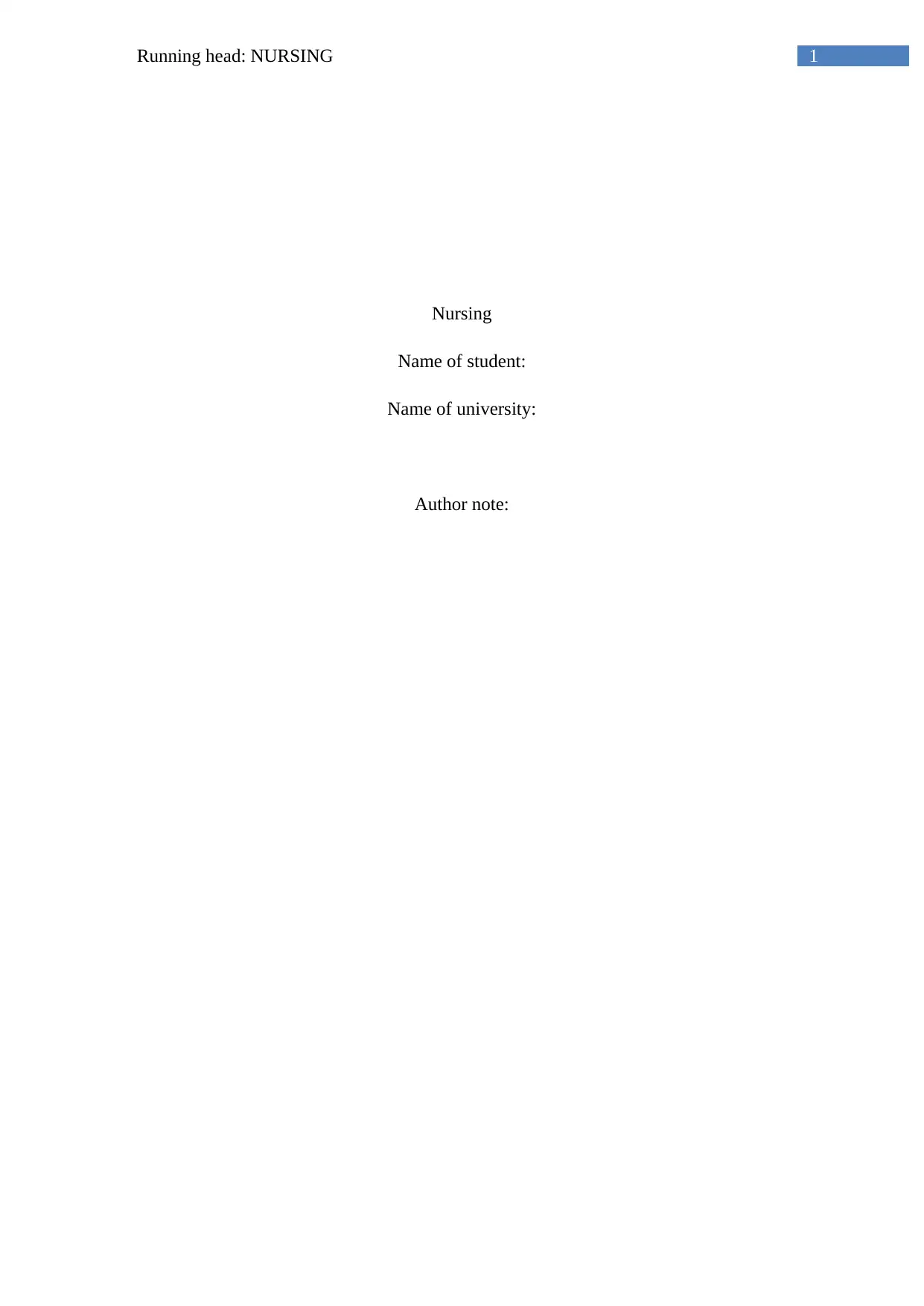
1Running head: NURSING
Nursing
Name of student:
Name of university:
Author note:
Nursing
Name of student:
Name of university:
Author note:
Secure Best Marks with AI Grader
Need help grading? Try our AI Grader for instant feedback on your assignments.
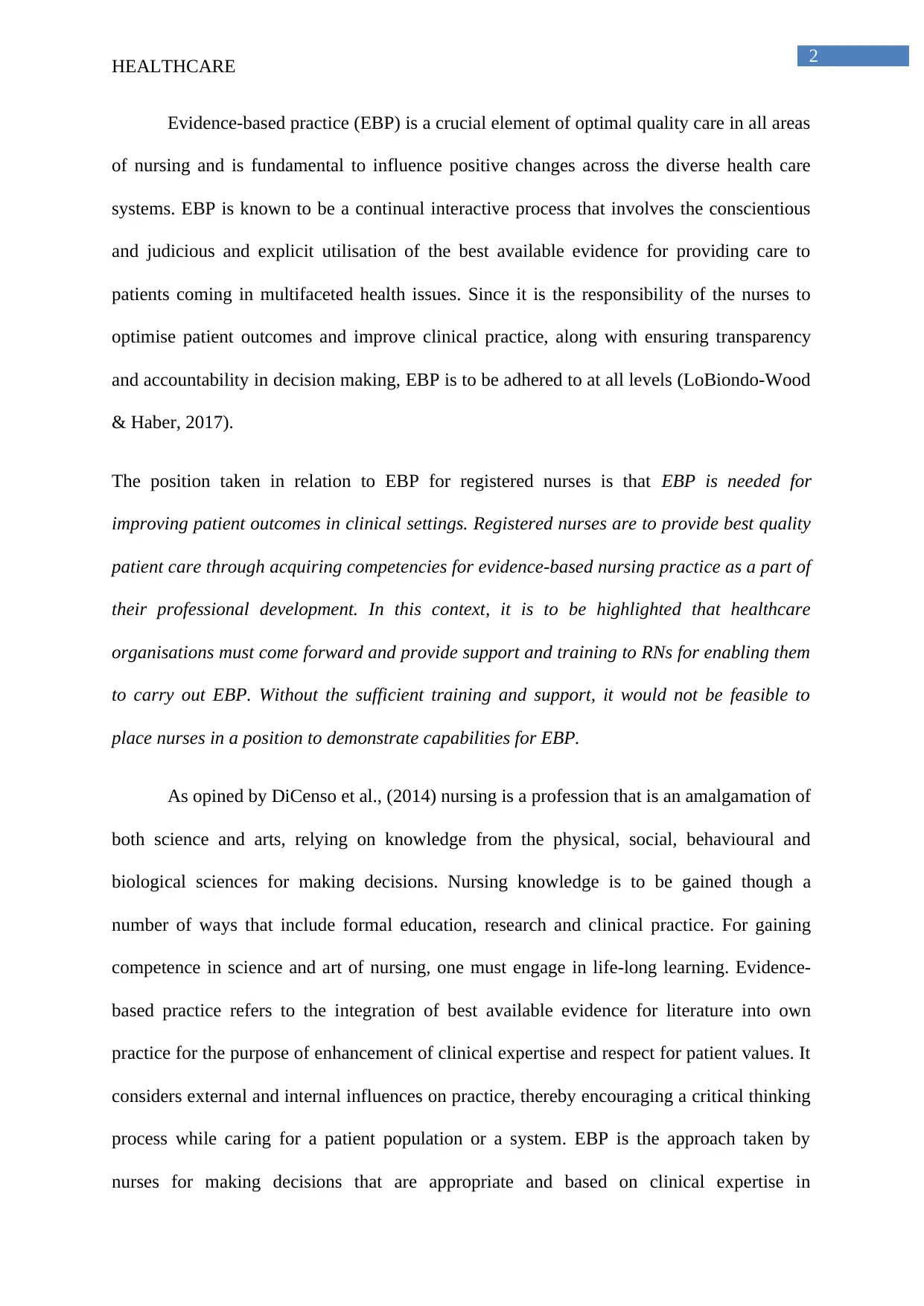
2
HEALTHCARE
Evidence-based practice (EBP) is a crucial element of optimal quality care in all areas
of nursing and is fundamental to influence positive changes across the diverse health care
systems. EBP is known to be a continual interactive process that involves the conscientious
and judicious and explicit utilisation of the best available evidence for providing care to
patients coming in multifaceted health issues. Since it is the responsibility of the nurses to
optimise patient outcomes and improve clinical practice, along with ensuring transparency
and accountability in decision making, EBP is to be adhered to at all levels (LoBiondo-Wood
& Haber, 2017).
The position taken in relation to EBP for registered nurses is that EBP is needed for
improving patient outcomes in clinical settings. Registered nurses are to provide best quality
patient care through acquiring competencies for evidence-based nursing practice as a part of
their professional development. In this context, it is to be highlighted that healthcare
organisations must come forward and provide support and training to RNs for enabling them
to carry out EBP. Without the sufficient training and support, it would not be feasible to
place nurses in a position to demonstrate capabilities for EBP.
As opined by DiCenso et al., (2014) nursing is a profession that is an amalgamation of
both science and arts, relying on knowledge from the physical, social, behavioural and
biological sciences for making decisions. Nursing knowledge is to be gained though a
number of ways that include formal education, research and clinical practice. For gaining
competence in science and art of nursing, one must engage in life-long learning. Evidence-
based practice refers to the integration of best available evidence for literature into own
practice for the purpose of enhancement of clinical expertise and respect for patient values. It
considers external and internal influences on practice, thereby encouraging a critical thinking
process while caring for a patient population or a system. EBP is the approach taken by
nurses for making decisions that are appropriate and based on clinical expertise in
HEALTHCARE
Evidence-based practice (EBP) is a crucial element of optimal quality care in all areas
of nursing and is fundamental to influence positive changes across the diverse health care
systems. EBP is known to be a continual interactive process that involves the conscientious
and judicious and explicit utilisation of the best available evidence for providing care to
patients coming in multifaceted health issues. Since it is the responsibility of the nurses to
optimise patient outcomes and improve clinical practice, along with ensuring transparency
and accountability in decision making, EBP is to be adhered to at all levels (LoBiondo-Wood
& Haber, 2017).
The position taken in relation to EBP for registered nurses is that EBP is needed for
improving patient outcomes in clinical settings. Registered nurses are to provide best quality
patient care through acquiring competencies for evidence-based nursing practice as a part of
their professional development. In this context, it is to be highlighted that healthcare
organisations must come forward and provide support and training to RNs for enabling them
to carry out EBP. Without the sufficient training and support, it would not be feasible to
place nurses in a position to demonstrate capabilities for EBP.
As opined by DiCenso et al., (2014) nursing is a profession that is an amalgamation of
both science and arts, relying on knowledge from the physical, social, behavioural and
biological sciences for making decisions. Nursing knowledge is to be gained though a
number of ways that include formal education, research and clinical practice. For gaining
competence in science and art of nursing, one must engage in life-long learning. Evidence-
based practice refers to the integration of best available evidence for literature into own
practice for the purpose of enhancement of clinical expertise and respect for patient values. It
considers external and internal influences on practice, thereby encouraging a critical thinking
process while caring for a patient population or a system. EBP is the approach taken by
nurses for making decisions that are appropriate and based on clinical expertise in
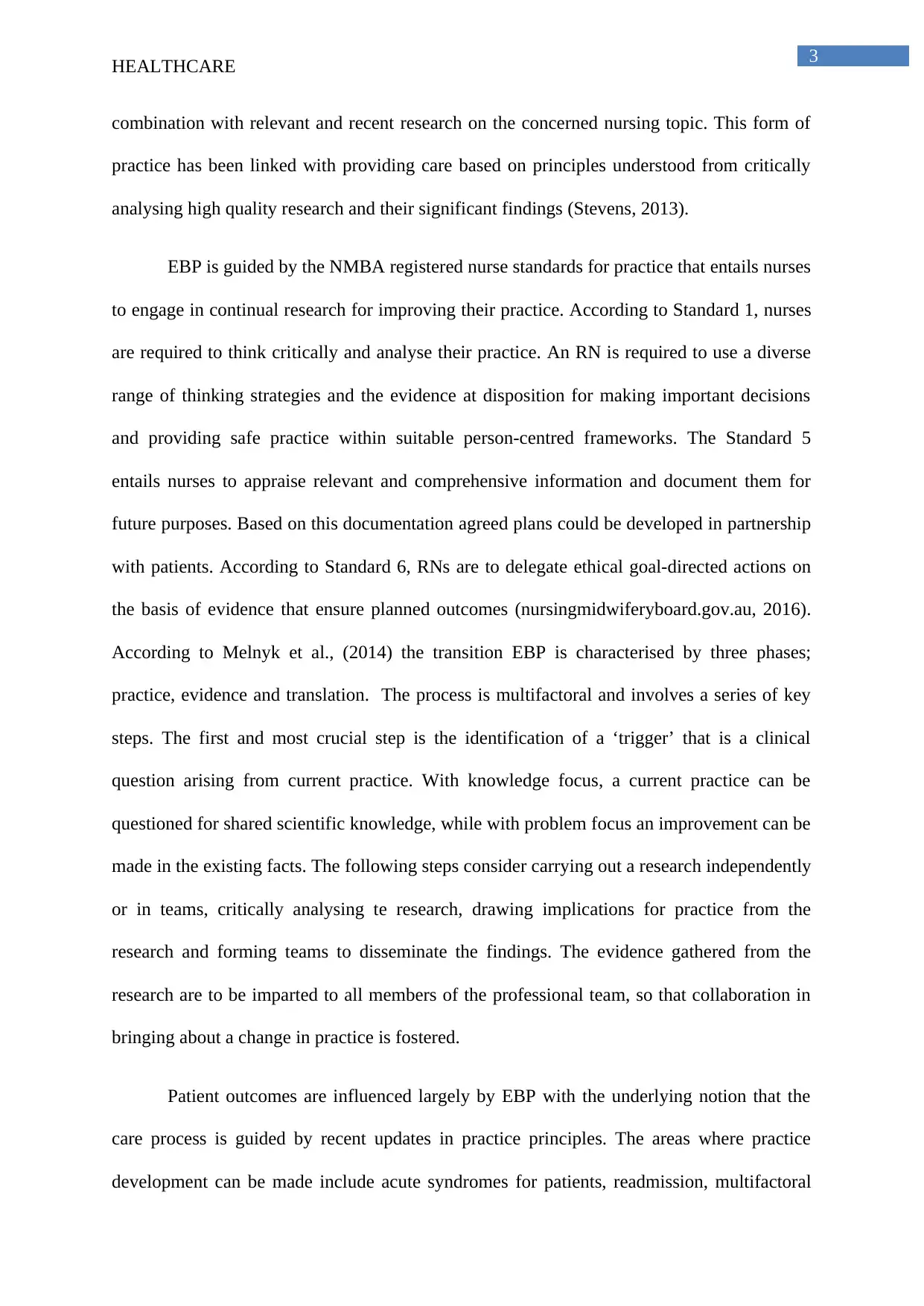
3
HEALTHCARE
combination with relevant and recent research on the concerned nursing topic. This form of
practice has been linked with providing care based on principles understood from critically
analysing high quality research and their significant findings (Stevens, 2013).
EBP is guided by the NMBA registered nurse standards for practice that entails nurses
to engage in continual research for improving their practice. According to Standard 1, nurses
are required to think critically and analyse their practice. An RN is required to use a diverse
range of thinking strategies and the evidence at disposition for making important decisions
and providing safe practice within suitable person-centred frameworks. The Standard 5
entails nurses to appraise relevant and comprehensive information and document them for
future purposes. Based on this documentation agreed plans could be developed in partnership
with patients. According to Standard 6, RNs are to delegate ethical goal-directed actions on
the basis of evidence that ensure planned outcomes (nursingmidwiferyboard.gov.au, 2016).
According to Melnyk et al., (2014) the transition EBP is characterised by three phases;
practice, evidence and translation. The process is multifactoral and involves a series of key
steps. The first and most crucial step is the identification of a ‘trigger’ that is a clinical
question arising from current practice. With knowledge focus, a current practice can be
questioned for shared scientific knowledge, while with problem focus an improvement can be
made in the existing facts. The following steps consider carrying out a research independently
or in teams, critically analysing te research, drawing implications for practice from the
research and forming teams to disseminate the findings. The evidence gathered from the
research are to be imparted to all members of the professional team, so that collaboration in
bringing about a change in practice is fostered.
Patient outcomes are influenced largely by EBP with the underlying notion that the
care process is guided by recent updates in practice principles. The areas where practice
development can be made include acute syndromes for patients, readmission, multifactoral
HEALTHCARE
combination with relevant and recent research on the concerned nursing topic. This form of
practice has been linked with providing care based on principles understood from critically
analysing high quality research and their significant findings (Stevens, 2013).
EBP is guided by the NMBA registered nurse standards for practice that entails nurses
to engage in continual research for improving their practice. According to Standard 1, nurses
are required to think critically and analyse their practice. An RN is required to use a diverse
range of thinking strategies and the evidence at disposition for making important decisions
and providing safe practice within suitable person-centred frameworks. The Standard 5
entails nurses to appraise relevant and comprehensive information and document them for
future purposes. Based on this documentation agreed plans could be developed in partnership
with patients. According to Standard 6, RNs are to delegate ethical goal-directed actions on
the basis of evidence that ensure planned outcomes (nursingmidwiferyboard.gov.au, 2016).
According to Melnyk et al., (2014) the transition EBP is characterised by three phases;
practice, evidence and translation. The process is multifactoral and involves a series of key
steps. The first and most crucial step is the identification of a ‘trigger’ that is a clinical
question arising from current practice. With knowledge focus, a current practice can be
questioned for shared scientific knowledge, while with problem focus an improvement can be
made in the existing facts. The following steps consider carrying out a research independently
or in teams, critically analysing te research, drawing implications for practice from the
research and forming teams to disseminate the findings. The evidence gathered from the
research are to be imparted to all members of the professional team, so that collaboration in
bringing about a change in practice is fostered.
Patient outcomes are influenced largely by EBP with the underlying notion that the
care process is guided by recent updates in practice principles. The areas where practice
development can be made include acute syndromes for patients, readmission, multifactoral
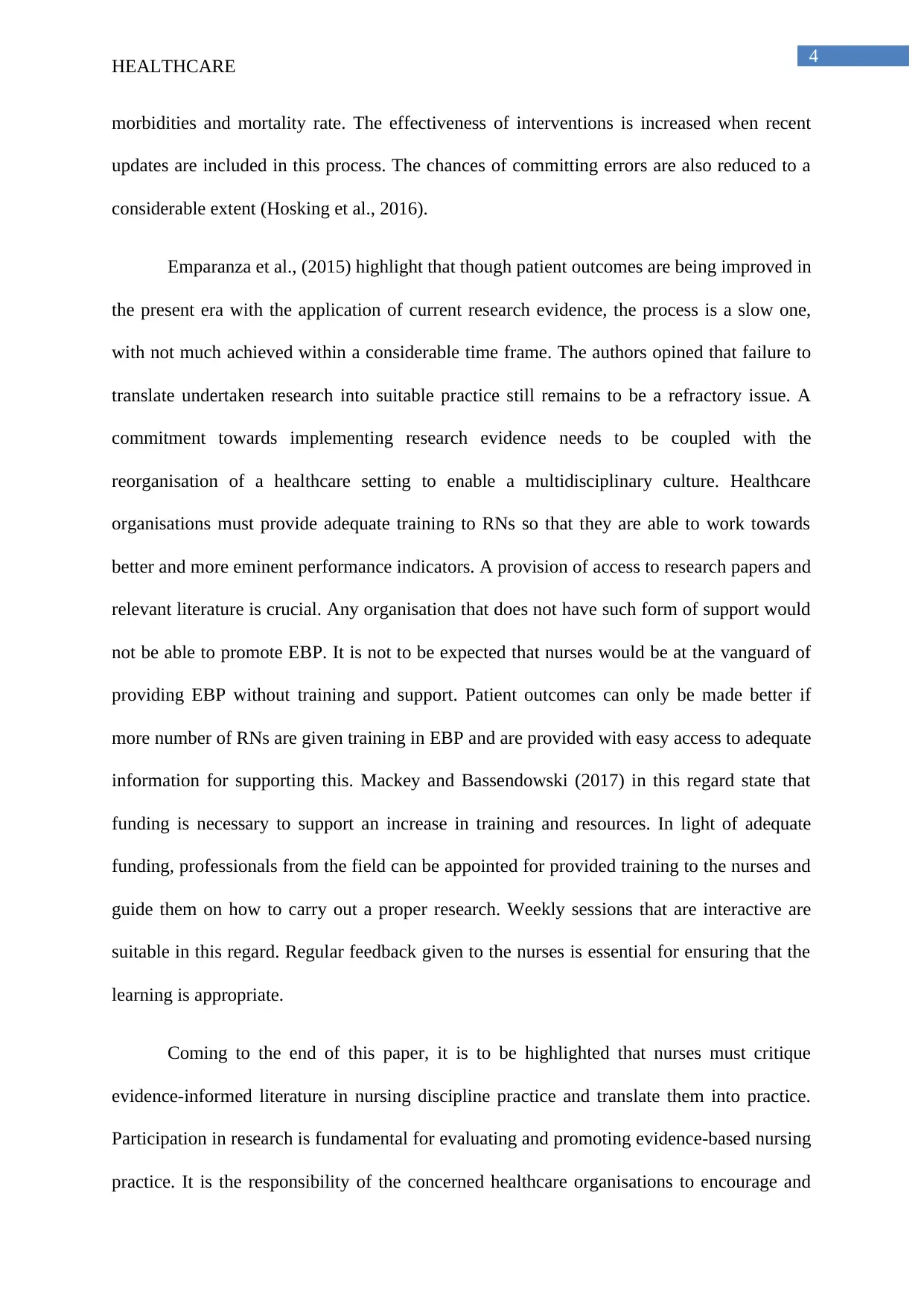
4
HEALTHCARE
morbidities and mortality rate. The effectiveness of interventions is increased when recent
updates are included in this process. The chances of committing errors are also reduced to a
considerable extent (Hosking et al., 2016).
Emparanza et al., (2015) highlight that though patient outcomes are being improved in
the present era with the application of current research evidence, the process is a slow one,
with not much achieved within a considerable time frame. The authors opined that failure to
translate undertaken research into suitable practice still remains to be a refractory issue. A
commitment towards implementing research evidence needs to be coupled with the
reorganisation of a healthcare setting to enable a multidisciplinary culture. Healthcare
organisations must provide adequate training to RNs so that they are able to work towards
better and more eminent performance indicators. A provision of access to research papers and
relevant literature is crucial. Any organisation that does not have such form of support would
not be able to promote EBP. It is not to be expected that nurses would be at the vanguard of
providing EBP without training and support. Patient outcomes can only be made better if
more number of RNs are given training in EBP and are provided with easy access to adequate
information for supporting this. Mackey and Bassendowski (2017) in this regard state that
funding is necessary to support an increase in training and resources. In light of adequate
funding, professionals from the field can be appointed for provided training to the nurses and
guide them on how to carry out a proper research. Weekly sessions that are interactive are
suitable in this regard. Regular feedback given to the nurses is essential for ensuring that the
learning is appropriate.
Coming to the end of this paper, it is to be highlighted that nurses must critique
evidence-informed literature in nursing discipline practice and translate them into practice.
Participation in research is fundamental for evaluating and promoting evidence-based nursing
practice. It is the responsibility of the concerned healthcare organisations to encourage and
HEALTHCARE
morbidities and mortality rate. The effectiveness of interventions is increased when recent
updates are included in this process. The chances of committing errors are also reduced to a
considerable extent (Hosking et al., 2016).
Emparanza et al., (2015) highlight that though patient outcomes are being improved in
the present era with the application of current research evidence, the process is a slow one,
with not much achieved within a considerable time frame. The authors opined that failure to
translate undertaken research into suitable practice still remains to be a refractory issue. A
commitment towards implementing research evidence needs to be coupled with the
reorganisation of a healthcare setting to enable a multidisciplinary culture. Healthcare
organisations must provide adequate training to RNs so that they are able to work towards
better and more eminent performance indicators. A provision of access to research papers and
relevant literature is crucial. Any organisation that does not have such form of support would
not be able to promote EBP. It is not to be expected that nurses would be at the vanguard of
providing EBP without training and support. Patient outcomes can only be made better if
more number of RNs are given training in EBP and are provided with easy access to adequate
information for supporting this. Mackey and Bassendowski (2017) in this regard state that
funding is necessary to support an increase in training and resources. In light of adequate
funding, professionals from the field can be appointed for provided training to the nurses and
guide them on how to carry out a proper research. Weekly sessions that are interactive are
suitable in this regard. Regular feedback given to the nurses is essential for ensuring that the
learning is appropriate.
Coming to the end of this paper, it is to be highlighted that nurses must critique
evidence-informed literature in nursing discipline practice and translate them into practice.
Participation in research is fundamental for evaluating and promoting evidence-based nursing
practice. It is the responsibility of the concerned healthcare organisations to encourage and
Secure Best Marks with AI Grader
Need help grading? Try our AI Grader for instant feedback on your assignments.

5
HEALTHCARE
train nurses so that they can achieve the aim of delivering suitable EBP. With the support
received from their end, nurses can transform their practice for the betterment of the patient
populations.
HEALTHCARE
train nurses so that they can achieve the aim of delivering suitable EBP. With the support
received from their end, nurses can transform their practice for the betterment of the patient
populations.
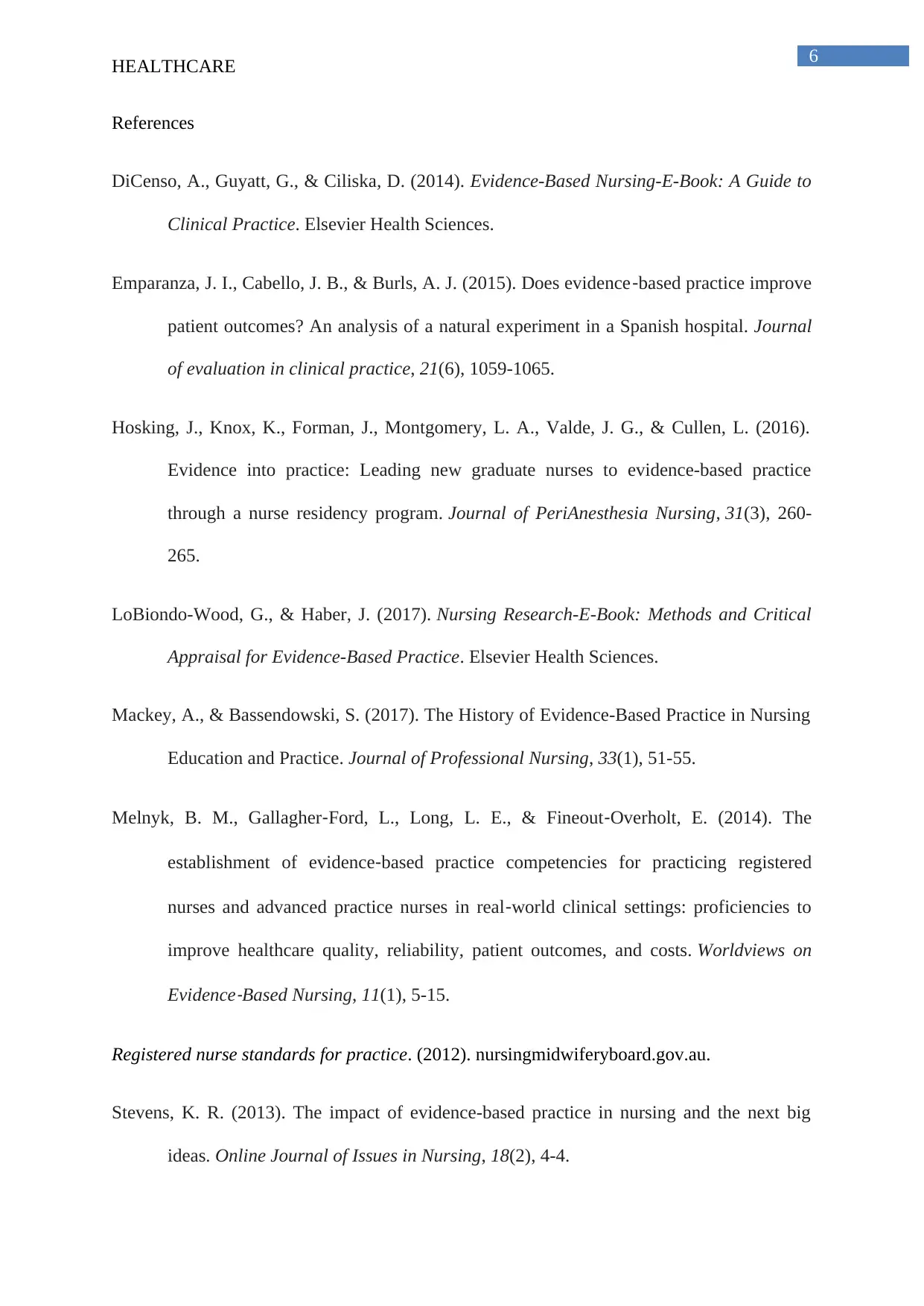
6
HEALTHCARE
References
DiCenso, A., Guyatt, G., & Ciliska, D. (2014). Evidence-Based Nursing-E-Book: A Guide to
Clinical Practice. Elsevier Health Sciences.
Emparanza, J. I., Cabello, J. B., & Burls, A. J. (2015). Does evidence‐based practice improve
patient outcomes? An analysis of a natural experiment in a Spanish hospital. Journal
of evaluation in clinical practice, 21(6), 1059-1065.
Hosking, J., Knox, K., Forman, J., Montgomery, L. A., Valde, J. G., & Cullen, L. (2016).
Evidence into practice: Leading new graduate nurses to evidence-based practice
through a nurse residency program. Journal of PeriAnesthesia Nursing, 31(3), 260-
265.
LoBiondo-Wood, G., & Haber, J. (2017). Nursing Research-E-Book: Methods and Critical
Appraisal for Evidence-Based Practice. Elsevier Health Sciences.
Mackey, A., & Bassendowski, S. (2017). The History of Evidence-Based Practice in Nursing
Education and Practice. Journal of Professional Nursing, 33(1), 51-55.
Melnyk, B. M., Gallagher‐Ford, L., Long, L. E., & Fineout‐Overholt, E. (2014). The
establishment of evidence‐based practice competencies for practicing registered
nurses and advanced practice nurses in real‐world clinical settings: proficiencies to
improve healthcare quality, reliability, patient outcomes, and costs. Worldviews on
Evidence
‐Based Nursing, 11(1), 5-15.
Registered nurse standards for practice. (2012). nursingmidwiferyboard.gov.au.
Stevens, K. R. (2013). The impact of evidence-based practice in nursing and the next big
ideas. Online Journal of Issues in Nursing, 18(2), 4-4.
HEALTHCARE
References
DiCenso, A., Guyatt, G., & Ciliska, D. (2014). Evidence-Based Nursing-E-Book: A Guide to
Clinical Practice. Elsevier Health Sciences.
Emparanza, J. I., Cabello, J. B., & Burls, A. J. (2015). Does evidence‐based practice improve
patient outcomes? An analysis of a natural experiment in a Spanish hospital. Journal
of evaluation in clinical practice, 21(6), 1059-1065.
Hosking, J., Knox, K., Forman, J., Montgomery, L. A., Valde, J. G., & Cullen, L. (2016).
Evidence into practice: Leading new graduate nurses to evidence-based practice
through a nurse residency program. Journal of PeriAnesthesia Nursing, 31(3), 260-
265.
LoBiondo-Wood, G., & Haber, J. (2017). Nursing Research-E-Book: Methods and Critical
Appraisal for Evidence-Based Practice. Elsevier Health Sciences.
Mackey, A., & Bassendowski, S. (2017). The History of Evidence-Based Practice in Nursing
Education and Practice. Journal of Professional Nursing, 33(1), 51-55.
Melnyk, B. M., Gallagher‐Ford, L., Long, L. E., & Fineout‐Overholt, E. (2014). The
establishment of evidence‐based practice competencies for practicing registered
nurses and advanced practice nurses in real‐world clinical settings: proficiencies to
improve healthcare quality, reliability, patient outcomes, and costs. Worldviews on
Evidence
‐Based Nursing, 11(1), 5-15.
Registered nurse standards for practice. (2012). nursingmidwiferyboard.gov.au.
Stevens, K. R. (2013). The impact of evidence-based practice in nursing and the next big
ideas. Online Journal of Issues in Nursing, 18(2), 4-4.
1 out of 6
Related Documents
Your All-in-One AI-Powered Toolkit for Academic Success.
+13062052269
info@desklib.com
Available 24*7 on WhatsApp / Email
![[object Object]](/_next/static/media/star-bottom.7253800d.svg)
Unlock your academic potential
© 2024 | Zucol Services PVT LTD | All rights reserved.





